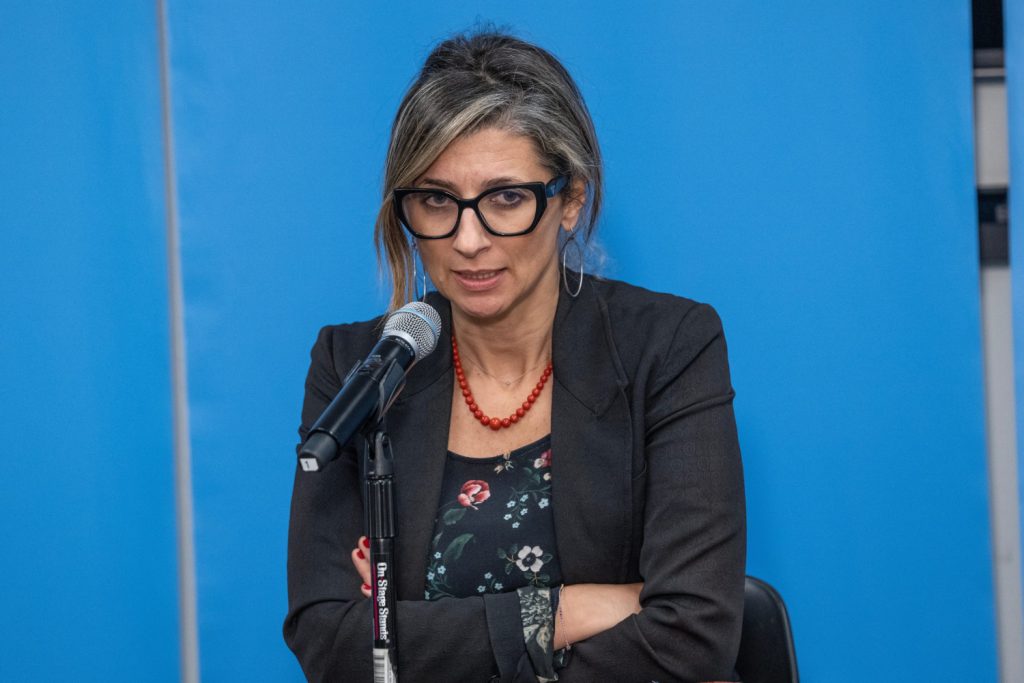Australia/Israel Review
Deconstruction Zone: The Opposite of “Arbitrary”
Aug 3, 2023 | A J Caschetta

Francesca Albanese, the “Special Rapporteur on the situation of human rights in the Palestinian territories occupied since 1967,” issued a new UN Human Rights Council (UNHRC) report on alleged Israeli crimes against Palestinians in mid-July
Critics have been withering in response, but perhaps most remarkably, Albanese does not appear to understand what the word “arbitrary” means.
It is certainly the most abused word in the 21-page report, appearing an astonishing 32 times.
Albanese accuses Israel of “arbitrary deprivation of liberty,” “arbitrary arrest” and “arbitrary exercise of power.” Israel “arbitrarily and severely restricts Palestinians’ movement,” she complains. “Arbitrary detention” is commonplace, she states.
Each iteration of the word is egregiously inaccurate. For example, the report’s opening sentence states that it presents “concerns related to the widespread and systematic arbitrary deprivation of liberty in the occupied Palestinian territory” (emphasis mine). This is an oxymoron. Something cannot be both “systematic” and “arbitrary” simultaneously.
The word “arbitrary” comes from the Latin word arbiter or “judge”. By the mid-17th century, the word had acquired its current meaning of “random, irrational, capricious, injudicious.”
Of course, Israel’s treatment of the Palestinians is the opposite of arbitrary. It is consistent, logical, circumspect and judicious. For example, when Hamas and Palestinian Islamic Jihad (PIJ) launch missiles at Israel, Israel’s response is calibrated to target only the combatants and their infrastructure in Gaza. The terror groups’ poorly-made and wildly inaccurate missiles, on the other hand, are quite arbitrary, often killing more Palestinians than Israelis.
Palestinian suicide bombers, car-rammers and stabbers are in many ways “arbitrary” in their selection of targets, relying on chance and opportunity in order to attack shoppers, pedestrians, commuters and others.
If Israel wanted to act in a genuinely arbitrary fashion, it could kill Palestinians wholesale, efficiently and quickly eliminating threats. It could make no discrimination between combatants and civilians. It could have chosen not to spend nearly eight decades offering peace deals to implacable enemies who deny its right to exist.
But Israel has decided not to be arbitrary. Thus, it faces the very difficult task of determining which Palestinians plan to kill Israelis and which do not. This requires counterterrorism measures, surveillance and, when suspects are detected, prosecution and incarceration. To Francesca Albanese, all such measures, especially incarceration, are war crimes.
Speaking of “incarceration,” the second most abused word in Albanese’s report is “carceral”. It appears 18 times in various forms, sometimes in conjunction with “arbitrary”, such as “arbitrariness of the occupation’s carceral regime.”
Israel, a “carceral state”, has created a “carceral landscape” by employing “physical carcerality”, “bureaucratic carcerality” and “digital carcerality”. Israel treats “Palestinians as a collective, incarcerable threat” and has turned the West Bank into a prison through its “carceral architecture”.
If one sentence summarises the entire 10,700-word report, it is this one: “The widespread and systemic arbitrariness of the occupation’s carceral regime is yet another manifestation of Israel’s inherently illegal occupation.”
Nowhere is Albanese’s fantasy more wrong-headed than in her treatment of Palestinian children. She sees Israel’s occasional detention of child soldiers as a grievous crime, but the real crime is obvious: Palestinians turn their children into soldiers. The entire Palestinian educational system inculcates children to embrace terrorism, filling their heads with dreams of martyrdom. Hamas and PIJ have devoted a great deal of energy to recruiting, training and deploying children as killers, training them in firearms and explosives use, hand-to-hand combat and other military tactics at their summer camps.
Albanese ignores these facts, complaining instead that children are sometimes arrested and treated “like dangerous criminals”. Some of them, despite their tender age, are in fact dangerous, but Albanese sees any Israeli attempt to counter this danger as an unacceptable repression of Palestinian “civil society”.
Of course, not everyone criticised Albanese’s report. Hamas officials loved it. “We hail the speech of Francesca Albanese,” the terrorist organisation wrote in a statement. Hamas’ affinity for Albanese is understandable, but she doesn’t return the favour in her report – she takes great pains to avoid mentioning the word “Hamas”, preferring to refer to it as “the de facto authorities in Gaza.”
Given all this, it seems long past time to ignore every report the UNHRC issues on Israel. The UN should instead concentrate on real abuses in countries like China, Pakistan, Cuba and Russia – all of which, not surprisingly, currently serve on the Human Rights Council.
A.J. Caschetta is a principal lecturer at the Rochester Institute of Technology and a Ginsburg/Milstein Writing Fellow at the Middle East Forum. © Jewish News Syndicate (JNS.org), reprinted by permission, all rights reserved.
Tags: Israel, Palestinians, UNHRC, United Nations






